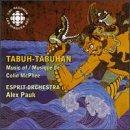| All Artists: Colin McPhee, Alex Pauk, Espirit Orchestra Title: Colin McPhee: Tabuh-Tabuhan Members Wishing: 0 Total Copies: 0 Label: Cbc Release Date: 2/17/1998 Genre: Classical Styles: Forms & Genres, Concertos, Historical Periods, Modern, 20th, & 21st Century, Symphonies Number of Discs: 1 SwapaCD Credits: 1 UPC: 059582518120 |
Search - Colin McPhee, Alex Pauk, Espirit Orchestra :: Colin McPhee: Tabuh-Tabuhan
 | Colin McPhee, Alex Pauk, Espirit Orchestra Colin McPhee: Tabuh-Tabuhan Genre: Classical
|
Larger Image |
CD Details |
CD ReviewsMarginalized genius K. Doles | 07/20/2000 (5 out of 5 stars) "Colin McPhee's music sounds like it could have been written in the last fifteen years, not between 1936 and 1960. Probably the first composer to effectively and respectfully synthesize the music of a non-Western culture (in this case Balinese gamelan; McPhee lived on the island of Bali, studying its music and culture, for most of the 1930s) with Western art music, well before the advent of "multiculturalism," his music is rarely performed today. This recording is a fine record of his compositional output, including all of his major surviving works for orchestra. The quality of the performances is first-rate; the quality of the compositions themselves is another matter. McPhee's output was adversely affected by personal and financial problems after World War II, and he never again attained the compositional heights reached in _Tabuh-Tabuhan_, his Pulitzer Prize-winning work from 1936. His Symphony no. 2 and the _Nocturne_ for chamber orchestra are still excellent works, but his final two completed compositions, "Transitions" and the "Concerto for Wind Orchestra" are pale shadows of his earlier music. I still give this recording my highest recommendation!" Ahead of the curve in several ways. But sadly overlooked. Bob Zeidler | Charlton, MA United States | 08/17/2004 (5 out of 5 stars) "Colin McPhee (1900 - 1964) could easily have been included among that select group of composers known as "American mavericks" had it not been for one minor technicality: McPhee was born in Montréal and grew up in Toronto. Never mind that McPhee studied in New York, under the tutelage of Edgard Varèse, and eventually settled back in the U.S. for the final two decades of his life after spending a number of years in Bali; he is at least as qualified as are Varèse and Leo Ornstein to be included in this group. (A curious lacuna in Michael Broyles's new book, "Mavericks and Other Traditions in American Music," is that McPhee doesn't even earn an index mention, whereas Varèse and Ornstein are given big bleeding chunks of commentary! But that is the subject of another, different review.) The title work of this album, "Tabuh-tabuhan," is the single work that McPhee is most famed for. An orchestral toccata in three movements, it incorporates Balinese gamelan instruments (in addition to two pianos) which, because of their unique tuning, provide a piquant "spice" to the harmonic flavoring of the work. In this, he was years ahead of Henry Cowell and Lou Harrison (and, in an "Eastern"sense, Alan Hovhaness as well) in the use of these instruments. Even more, McPhee was more than a few decades ahead of Steve Reich and Philip Glass in using percussive, driving ostinatos in a thoroughly minimalistic sense in "Tabuh-tabuhan." Two generations ago, Howard Hanson and his Eastman-Rochester Orchestra committed a fine performance of this work to disk (so long ago that it was "mono only"). But, good as that performance was, this performance by the Esprit Orchestra de Toronto-a group that specializes in contemporary music-tops it quite comfortably in splendid stereo sound. "Nocturne" (coming more than two decades later, in 1958) is scored-and "flavored"-much like "Tabuh-tabuhan" except that it is in a single, more relaxed, movement, as its title would suggest. Even more like "Tabuh-tabuhan" is his "Concerto for Wind Orchestra" (1960, his last completed work). The three-movement "Symphony No. 2" (1957, commissioned by the Louisville Orchestra) is quite Ravel-like in its clarity and, to a lesser extent, McPhee's use of harmony (here again subtly affected by his use of gamelan instruments). It has a "fairy tale" atmosphere that brings to mind Ravel's "Ma mère l'oye" ("Mother Goose") ballet suite. "Transitions" (1954, commissioned by the Serge Koussevitsky Foundation) is described in the booklet notes as McPhee's "...own transition back into the world of western commercial acceptability" after, literally, decades of Balinese gamelan-inspired "Eastern-leaning" music. Scored for full orchestra rich in percussion, it IS decidedly more conventional than the other works on the album. Nonetheless, enough of the "earlier" McPhee remains to identify this as one of his own. Was McPhee our very first minimalist? He might well have been; clearly, the minimalist characteristics are there for all to compare with later Reich and Glass. He certainly predated Cowell and Harrison in incorporating gamelan instruments. Interestingly, I find no evidence of his early tutelage under Varèse. (Can I have a big "Hooray!"?) And he wrote with a sense of instrumental and harmonic clarity of which Ravel might well have been proud. Look no further for an integral compilation of the "important" music of Colin McPhee, unsung and nearly-forgotten maverick. This is the one to have! Bob Zeidler" Decades ahead of its time doublehighc | California | 10/10/2000 (4 out of 5 stars) "This beautiful worldly music was decades ahead of its time and deserves more performances and more audiences. The Esprit Orchestra is a 45-piece group, which means the large orchestral pieces don't have some of their potential radiance. But these are still very fine recordings of gorgeous compositions, and highly recommended."
|

 Track Listings (11) - Disc #1
Track Listings (11) - Disc #1